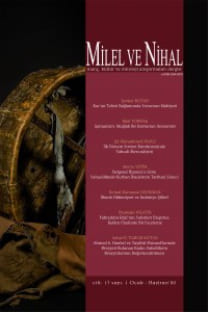İngiliz Romantizminde Kötülük Algısı: J. R. R. Tolkien ve Yüzük "Süregiden Bir Kararsızlık"
The Understanding of Evil in British Romanticism: J. R. R. Tolkien and the Ring “a Running Ambivalence”
___
- Arendt, Hannah. Eichmann in Jerusalem: a Report on the Banality of Evil. New York: Viking Press, 1963.
- Augustine. City of God. Translated by Henry Bettenson. New York: Penguin Books, 1984.
- _______. Confessions. Translated by Henry Chadwick. Oxford: Oxford University Press, 1991.
- Blackham, Robert S. Tolkien and the Peril of War. Gloucestershire: The History Press, 2011.
- Boethius. The Consolation of Philosophy. Translated by Joel C. Relihan. Indianapolis/Cambridge: Hackett Publishing Company, Inc., 2001.
- Boyce, Mary. “On the Zoroastrian Temple Cult of Fire.” Journal of the American Oriental Society 95, no. 3, (Jul. - Sep. 1975): 454-465.
- Carpenter, Humphrey. Tolkien: A Biography. Boston: Houghton Mifflin, 1977.
- Chadwick, Henry. Boethius: The Consolations of Music, Logic, Theology and Philosophy. New York: Oxford University Press, 1998.
- Cicero. De Natura Deorum. Translated by H. Rackham. Cambridge, MA: Harvard University Press, 1967.
- Curry, Patrick. “Tolkien and his Critics: A Critique.” In Root and Branch: Approaches Towards Understanding Tolkien, edited by Thomas Honegger, 81-150. Zurich/Berne: Walking Tree, 1999.
- _______. Defending the Middle-Earth: Tolkien, Myth and Modernity. London: Harper Collins Publishers, 1998.
- Freeman, Austin M. Tolkien Dogmatics: Theology through Mythology in Middle-Earth. Bellingham, WA: Lexham Press, 2022.
- Garth, John. Tolkien and the Great War: the Threshold of Middle-earth. London: HarperCollins, 2003.
- Giddings, Robert. J. R. R. Tolkien: This Far Land. London: Vision Press, 1983.
- Kerry, Paul. The Ring and the Cross: Christianity and the writings of J.R.R. Tolkien. New Jersey: Fairleigh Dickinson University Press, 2011.
- Lord Acton. “Letter to Bishop Mandell Creighton, April 5, 1887.” In Historical Essays and Studies, edited by J. N. Figgis and R. V. Laurence: 503-507. London: Macmillan, 1907.
- Milbank, Alison. Chesterton and Tolkien as Theologians: The Fantasy of the Real. London: T&T Clark, 2009.
- Orwell, George. “Lion and the Unicorn.” In Literature in the Modern World: Critical Essays and Documents, edited by Dennis Walder, 180-189. New York: Oxford University Press, 1992.
- Pinsent, Pat. "Religion: An Implicit Catholicism." In A Companion to J. R. R. Tolkien, edited by Stuart D. Lee, 446-460. Oxford: Wiley Blackwell, 2014
- Runciman, Steven. The Medieval Manichee: A Study of the Christian Dualist Heresy. Cambridge: Cambridge University Press, 1947.
- Rutledge, Fleming. The Battle for Middle-Earth: Tolkien's Divine Design in "The Lord of the Rings." Michigan: William B. Eerdmans Publishing Company, 2004.
- Shippey, Tom. A. J. R. R. Tolkien: Author of the Century. London: Harper Collins Publishers, 2000.
- _______. A. Road to Middle-Earth. London: Houghton Mifflin Harcourt, 2014.
- Sturch, Richard. Four Christian Fantasists A Study of the Fantastic Writings of George MacDonald, Charles Williams, C.S. Lewis and J.R.R. Tolkien. Zurich and Berne: Walking Tree Publishers, 2001.
- Tolkien, J. R. R. “Akallabêth.” In The Silmarillion, edited by Christopher Tolkien, 265-292. Boston: Houghton Mifflin, 1997.
- _______. “Mythopoeia.” In J. R. R. Tolkien, Tree and Leaf, edited by Christopher Tolkien, 83-90. London: HarperCollins Publishers, 2001.
- _______. “Of the Silmarils and the Unrest of the Noldor.” In The Silmarillion, edited by Christopher Tolkien, 59-64. Boston: Houghton Mifflin, 1997.
- _______. “On Fairy-Stories.” In The Monsters and the Critics and Other Essays, edited by Christopher Tolkien, 109-161. London: George Allen and Unwin, 1983.
- _______. “The Fellowship of the Ring.” In The Lord of the Rings: The One Volume Edition, 21-411. London: HarperCollins Publishers, 1995.
- _______. “The Return of the King.” In The Lord of the Rings: The One Volume Edition, 747-1032 London: HarperCollins Publishers, 1995.
- _______. “The Two Towers.” In The Lord of the Rings: The One Volume Edition, 413-745. London: HarperCollins Publishers, 1995.
- _______. Morgoth's Ring, edited by Christopher Tolkien. Boston: Houghton Mifflin, 2001.
- _______. The Letters of J. R. R. Tolkien, edited by Humphrey Carpenter and Christopher Tolkien. London: Harper Collins Publishers, 2006.
- _______. The Silmarillion, edited by Christopher Tolkien. Boston: Houghton Mifflin, 1997.
- Wood, Ralph C. The Gospel According to Tolkien: Visions of the Kingdom in Middle-earth. London: Westminster John Knox Press, 2003.
- ISSN: 1304-5482
- Yayın Aralığı: Yılda 2 Sayı
- Başlangıç: 2003
- Yayıncı: Milel ve Nihal: Eğitim, Kültür ve Düşünce Platformu Derneği
Yeni Dini Hareketlerde Yiyecek ve İçeceklerle İlgili Yaklaşım ve Uygulamalar
Hıristiyanlıkta Çıplak Dindarlık Sorunu
Ekrem SARIKÇIOĞLU, Azize UYGUN
Reform’dan Teokratik Krallığa: Michael Servetus Davası Üzerinden Yeni Bir John Calvin Okuması
Sosyal ve Siyasal Değişim Süreçlerinde Kilise: Mater Dolorosa Kilisesi
İngiliz Romantizminde Kötülük Algısı: J. R. R. Tolkien ve Yüzük "Süregiden Bir Kararsızlık"
